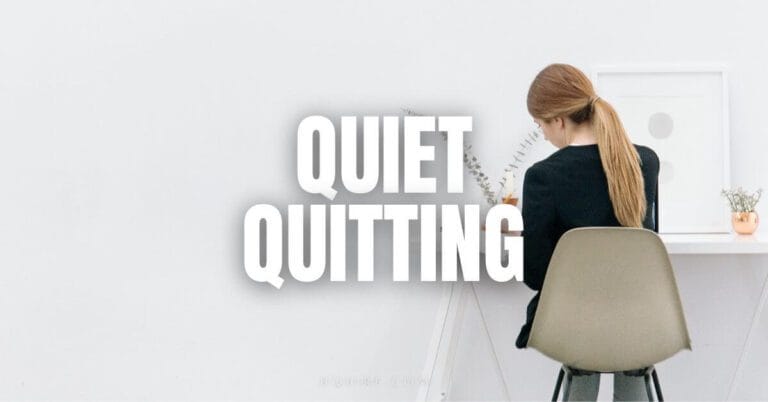“Can’t stop thinking about work at the weekend?”
Even though you may have told your boss you are not working on weekends, you can’t forget about the work you’ve left in the office.
For most of us, the weekends are a welcomed respite from the stressors of our daily lives and a chance to spend time doing things that we enjoy. However, intrusive thoughts about work during the weekend can ruin your time away from your stressful life at work.
How to Not Think About Working on Weekends?
There are many ways to distract yourself from thinking about work on the weekend. This includes things you can do at work like completing all your urgent tasks and preparing for the next week, as well as getting some things planned during the weekend like getting into nature, exercising, and spending time with your friends.
In this article, you will find a list of the fifteen most effective ways to not think about work on the weekends.
1. Complete your work during the week
One of the reasons that you might be thinking about working on the weekend is because there are a lot of little tasks that you didn’t manage to complete during the week.
A great way to cancel any worries is to make sure you get everything done before you leave work on Friday evening.
The key to success here is preparation.
Use the week to set yourself up for success by planning your work so that you complete your tasks as productively as possible.
It might not be easy, but if you stay away from social media and spend less time over lunch, you will find yourself with a few extra minutes each day to get more work done.
2. Get set for next week
No matter what work you have coming up, making a schedule and sticking to it is a great way to ease your work-related anxiety. This, in turn, will go far in keeping thoughts about work out of your head because you will have a set of steps to follow before the weekend rolls around.
Here’s how:
- Sketch out a list of tasks you need to complete and the steps to achieve them
- Identify which projects need to be finalized
- List the people you will need to talk to and why
Also, don’t leave any tasks for Monday that can be cleared up on Friday. That way you’ll have less anxiety (or Sunday Scaries) about the new work week.
3. Have the weekend planned
Take the time to block out your two days, including relaxing periods like reading and taking a long, hot bath. Don’t leave it to chance for the following two reasons:
- If you fill your weekend with activities, you’ll have less time and energy to think about work.
- Planning your weekend will give you something to look forward to, raising your chance of enjoying the time.
4. Talk your workplace worries out
According to Psychology Today, talking about our problems or negative emotions with someone we trust like a friend, family member, or therapist, makes us feel better.
Talking to someone about your worries can help both your mental and physical health by improving our immune system and reducing physical and emotional stress.
Don’t worry if you don’t like sharing your worries – writing about them can be just as beneficial.
5. Surround yourself with people you love
This might seem like a no-brainer, but spending time with the people who enrich your life gives you a chance to see that we don’t live to work but work to live.
It doesn’t have to be face to face, as long as you are stimulated and soothed by the connection.
But remember, the time must be meaningful and mindful. This means that you should check your interactions to make sure that you are in the moment.
6. Get out into nature
There is a growing body of scientific research indicating that exposure to nature and the natural world is beneficial for our health. Called ecopsychology, it posits that people who spend just two hours per week in natural spaces were more likely to report better measures of health and well-being.
It doesn’t matter whether you go for a day-long hike or prefer a ramble in the local park, getting out into the open will improve your mental, physical and psychological health, and better equip you to leave those workplace worries at work.
7. Actively clear your head
Meditation is a simple, rapid, and easy way to reduce stress and train your mind to prevent intrusive thoughts. According to the Mayo Clinic, there are many types to choose including guided, mantra, mindfulness, Qi gong, Tai chi, transcendental, and yoga.
All you need is a few minutes of free time each day to pay attention to your thoughts, emotions, and breathing to start feeling the benefits.
8. Get your heart pumping
Exercise in all its forms is a great way to divert your thoughts.
Not only does it give your mind something else to focus on, but moving your body decreases the tension in your muscles and helps release the stress you have stored up.
9. Stay away from technology
Technology is part of our lives, but that doesn’t mean that we have to let it intrude unnecessarily.
If you work on a computer throughout the week, stay off the screen over the weekend to eliminate any negative associations with work.
10. Give yourself permission for the time off
You need to remember that the weekend is your much-deserved time off. You earned it and you need it. It’s important to give yourself permission to relax and unwind when you’re not working.
11. Get relaxed
Even though the weekend might be full of chores and activities that you need to complete, you should also make time for rest and relaxation.
Take the time for yourself and think about the positive things that you have achieved in life and the things that you like about yourself.
Don’t be scared to light some scented candles and take a bath for as long as you like. Not only will you de-stress, but you’ll be invigorated and excited for all the great work you’ll do in the future.
12. Monitor your mental state
Even if you’re cheering your child’s basketball game or having lunch with friends, are you really present?
Be mindful and take the time to check whether you’re actively engaged in the activity. You want to be giving your full attention and enjoying the moment with all your senses.
When you’re self-aware, you’re more likely to recognize when thoughts about work are intruding and are better able to take your mind back to the present.
13. Check your lifestyle
If you regularly think about working out of hours, you might be triggered by elements of your lifestyle. For example:
- Caffeine will boost your concentration during work hours but when you come down, your stress and anxiety will increase.
- Lack of good quality sleep contributes to anxiety and unwelcomed thoughts.
- Lack of exercise will keep your body in a state of inactivity, allowing your mind to wander.
Make positive changes to improve your health and lifestyle.
14. Do something you love
We all have hobbies we love, whether it’s getting out into the garden, tinkering with a vintage car, or writing a food blog. Make time over the weekend to work on your passion project.
15. Consider a four-day workweek
With workplace flexibility and work-life balance increasingly part of workplace conversations, swapping to a four-day week is a reality for some workers. With a three-day weekend, you would have more time to disconnect from work and free your mind of work-related thoughts.
According to Euronews and CNN, in 2022 workers in Belgium and UK won the right to perform their full workweek in four days rather than five without a loss of salary. The four-day week trend might become the future of work and is being considered by unions throughout Europe.
In 2022 4 Day Week Global, a non-profit associated with Oxford University is running a pilot program in Canada and the US. If successful, companies might consider allowing workers to truncate their workweek without losing salary.
Why Should You Stop Thinking About Work at The Weekends
When are taking your weekends off, it is extremely important to stop thinking about work and leave your work at the office. Giving your mind and body a break from work allows for necessary restoration and rejuvenation.
Stop thinking about work during your rest day is crucial for preventing burnout and promoting overall well-being.
Additionally, enjoying time away from work can help improve focus and productivity when you return to your job.
Weekends off provide an opportunity for rest, relaxation, and reflection, which are all essential for a healthy mind and body.
If you ever need a long break from work, take a half-day off, or have a good reason why you need to rest during the weekends, just let your boss know.
If you are overly stressed at your work, sometimes, it is better to quit and gets a better job.
Read Also:
Join over 11,000+ achievers who are committed to achieving their career goals!






